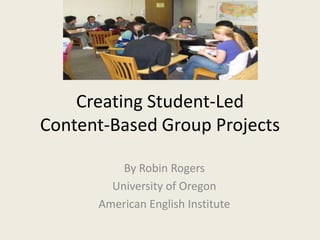
Creating student led content-based group projects
- 1. Creating Student-LedContent-Based Group Projects By Robin Rogers University of Oregon American English Institute
- 2. Purpose of Student-led Group Work Encourage creativity Help students develop responsibility for their own learning Encourage communication for a purpose Develop leadership skills Build confidence Learn content and vocabulary
- 3. Reading Discussion Project:What is it? All students have a weekly reading assignment to read a chapter or two in one of these books. Authentic Texts: My Freshman Year: What a Professor Learned by Becoming a Student, (2005) by Rebekah Nathan, Cornell University Press. American Ways: A Guide for Foreigners in the United States, (2003) by Gary Althen, Intercultural Press, Inc. In Defense of Food: An Eater’s Manifesto, (2008) by Michael Pollen, Penguin Group. Plugged In: The Generation Y Guide to Thriving at Work, (2008) by Tamara Erickson, Harvard Business Press.
- 4. Reading Discussion Project:What is it? Vocabulary Lists: Word Lists with 25 Academic Word List words that appear in that week’s reading are given to students at the beginning of each week as a study guide.
- 5. Reading Discussion Project: Students sign up for these roles at the beginning of the term. They know which week they will be the leader. Discussion Leader (3-5 leaders/week) Prepares discussion questions about the weekly reading assignments. Leads a small group of their classmates in a discussion Vocabulary Leader (2-4 leaders/week) Creates a vocabulary review activity Helps students review the part of speech, synonyms, definitions and spelling of the words
- 6. Teamwork
- 7. Discussion Leaders: Before the Discussion Read the assigned reading. Student leaders meet with other group members to create 6-10 discussion questions about the main ideas of the chapter. One member of the group sends the questions to the teacher to check grammar and clarity. Teacher meets with the students to give comments and possible corrections. Students make corrections and send them back to the teacher. Teacher posts electronic copy of the questions for the class to use to prepare answers for discussion.
- 8. Example of Student-Created Questions
- 9. Vocabulary Leaders:Before the Review Activity Find the definitions and parts of speech for the 25 vocabulary words for their week. Get together with their group to plan. Share their ideas for activities with the teacher before the day of the review. Tell the teacher if any materials are needed. Prepare materials and Rules/Roles for the Activity.
- 11. Learning through the process: Developing Leadership Skills Each Vocabulary Leader should have a role: Speaker: Giver of directions Communicate Clearly Set goals and rules for activity Know how to pronounce the words or questions Material Maker: Create and organize your materials and ideas Mediator, Score keeper and/or Time Keeper *Part of being a good leader is listening to your classmates.
- 12. Teachers’ Role: Encourage Creativity Give clear directions Model the activity Have fun and be creative Set up the structure by: Creating unity Offering safety and stability through organization Having a consistent schedule and routine Having set roles for participants
- 13. Students’ Roles: Prepare and lead All Students responsibilities: Learn vocabulary and prepare answers to questions Work as a team in and out of class Compromise and negotiate Balance tasks and create materials Develop communication skills Improve pronunciation and clarity Manage time of activity
- 14. Planning Make clear students’ roles in the group Set up meeting times with the teacher prior to class presentation Teacher plays a support role and helps clarify directions with the students
- 15. Things for students to consider when planning: When are you going to meet and plan? What ideas and questions can you contribute? Did you listen to others’ ideas also? Who is going to prepare materials? Who is going to explain the rules? Are you going to keep score and/or help your classmates?
- 16. Evaluating Group Work Students can reflect on their own learning. Grades are given based on: Correct use of grammar and vocabulary Preparation/ On time/ Organization Involvement in the activity Use of time Clarity of Instructions Collaboration and Teamwork
- 19. Learning through the process: Building Confidence Reading Discussion Project Allows Students To: Take risks Try something new Interact with the material Interact with the classmates Develop their English voice Share opinions in the discussion Speak English in a safe environment
- 20. Conclusion: Even though group work takes a lot of time to set up, it can be very rewarding and can lead to some great results. Students’ comments are always positive about this project. If the teachers are willing to take risks and time to set it up, this project can be challenging and rewarding.